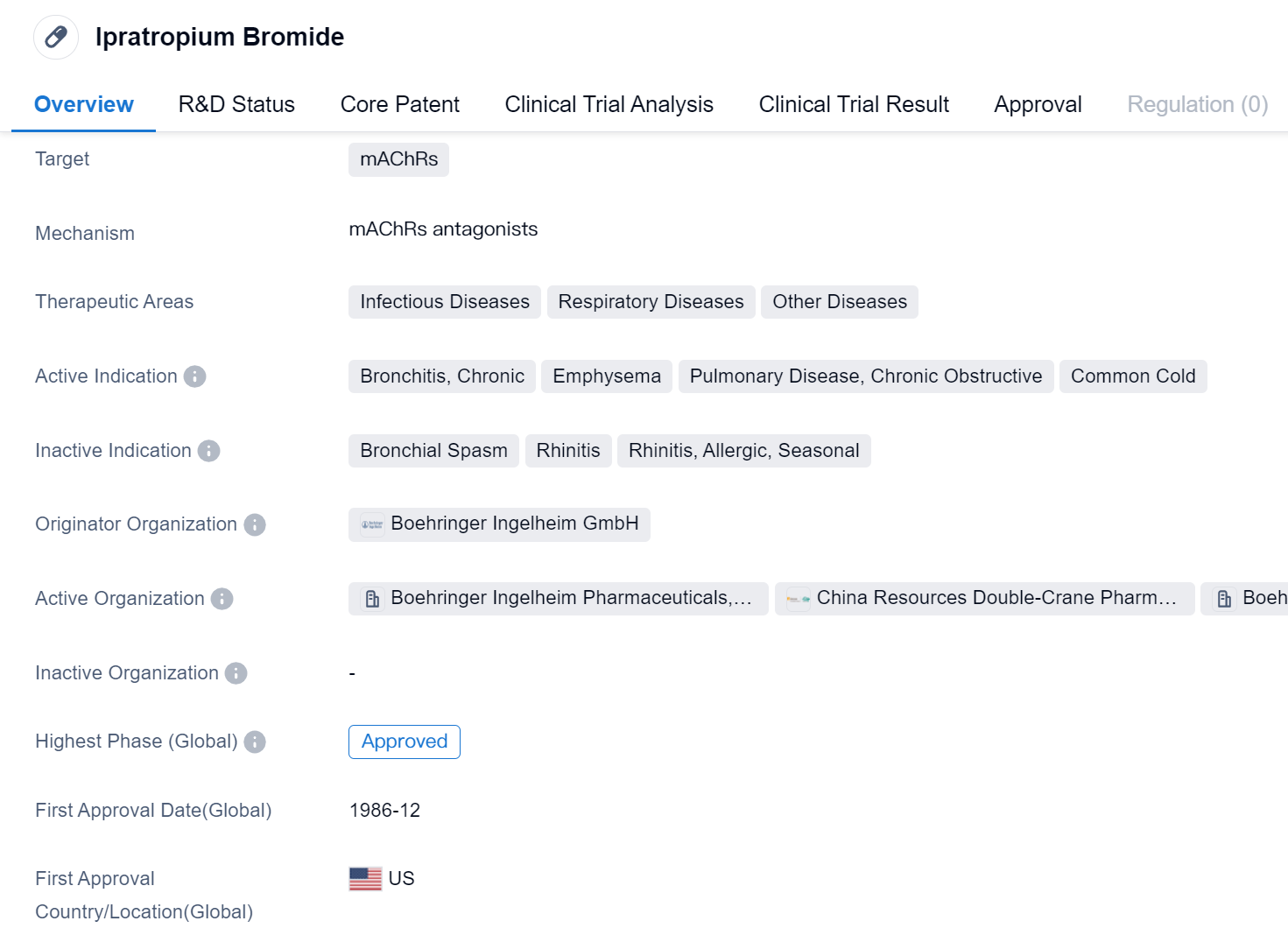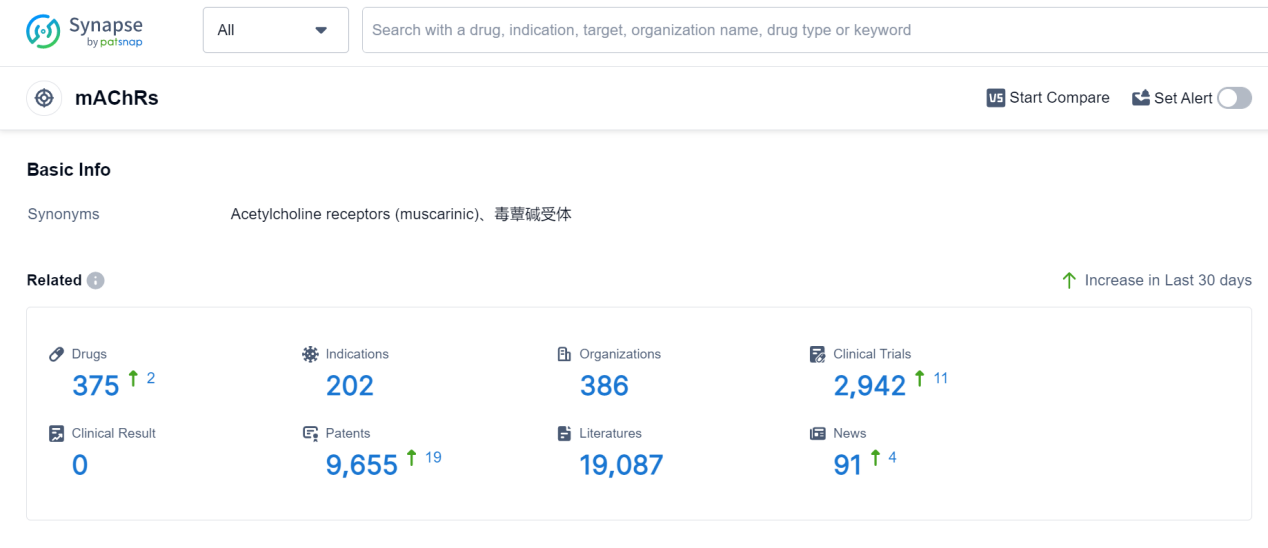An In-depth Analysis of Ipratropium Bromide's R&D Progress
Ipratropium Bromide's R&D Progress
Ipratropium Bromide is a small molecule drug that belongs to the class of muscarinic acetylcholine receptor (mAChR) antagonists. It is primarily used in the treatment of various respiratory diseases, infectious diseases, and other related conditions. The drug has been approved for use in the United States since December 1986 and is also approved in China.
The therapeutic areas in which Ipratropium Bromide is indicated include bronchitis, chronic obstructive pulmonary disease (COPD), emphysema, and the common cold. These conditions are characterized by respiratory symptoms such as coughing, wheezing, and shortness of breath. By targeting mAChRs, Ipratropium Bromide helps to relax and widen the airways, thereby improving breathing and alleviating symptoms.
The drug was developed by Boehringer Ingelheim GmbH, a pharmaceutical company known for its expertise in the field of biomedicine. Boehringer Ingelheim GmbH is the originator organization of Ipratropium Bromide, indicating that they were responsible for its initial discovery and development.
Ipratropium Bromide has reached the highest phase of development which is approved globally. This suggests that the drug has undergone extensive clinical trials and regulatory assessments to demonstrate its therapeutic benefits and minimal side effects.
Since its first approval in 1986, Ipratropium Bromide has been widely used in the management of respiratory diseases, particularly in patients with chronic conditions such as bronchitis and COPD. Its approval in China further highlights its global recognition and acceptance as an effective treatment option.
👇Please click on the image below to directly access the latest data (R&D Status | Core Patent | Clinical Trial | Approval status in Global countries) of this drug.
Mechanism of Action for Ipratropium Bromide: mAChRs antagonists
mAChRs antagonists refers to muscarinic acetylcholine receptor antagonists. Muscarinic acetylcholine receptors (mAChRs) are a type of G protein-coupled receptors found in the central and peripheral nervous systems. They are activated by the neurotransmitter acetylcholine.
Antagonists, in the context of pharmacology, are substances that bind to a receptor and block its activation. Therefore, mAChRs antagonists are drugs or compounds that bind to muscarinic acetylcholine receptors and prevent the activation of these receptors by acetylcholine.
From a biomedical perspective, mAChRs antagonists are commonly used in the treatment of various conditions such as overactive bladder, chronic obstructive pulmonary disease (COPD), and Parkinson's disease. By blocking the activation of mAChRs, these antagonists can help alleviate symptoms associated with excessive cholinergic activity, such as urinary urgency, bronchoconstriction, and tremors.
It is important to note that mAChRs antagonists can have side effects due to their broad effects on the cholinergic system. These side effects may include dry mouth, blurred vision, constipation, and cognitive impairment. The specific mAChRs antagonist used and its dosage will depend on the targeted condition and the individual patient's needs.
Drug Target R&D Trends for Ipratropium Bromide
Muscarinic acetylcholine receptors (mAChRs) are a class of G-protein coupled receptors found in various tissues throughout the human body. They play a crucial role in mediating the effects of acetylcholine, a neurotransmitter involved in numerous physiological processes. mAChRs are involved in regulating heart rate, smooth muscle contraction, glandular secretion, and neuronal signaling in the central and peripheral nervous systems. Dysfunction of mAChRs has been implicated in various diseases, including Alzheimer's disease, Parkinson's disease, and asthma. Understanding the role of mAChRs is essential for developing targeted therapies that modulate their activity, potentially leading to improved treatments for these conditions.
According to Patsnap Synapse, as of 6 Sep 2023, there are a total of 375 mAChRs drugs worldwide, from 386 organizations, covering 202 indications, and conducting 2942 clinical trials.
👇Please click on the picture link below for free registration or log in directly if you have a freemium account, you can browse the latest research progress on drugs, indications, organizations, clinical trials, clinical results, and drug patents related to this target
Conclusion
In summary, Ipratropium Bromide is a small molecule drug developed by Boehringer Ingelheim GmbH. It targets mAChRs and is approved for the treatment of respiratory diseases, infectious diseases, and other related conditions. With its long history of use and global approvals, Ipratropium Bromide has established itself as a valuable therapeutic option for patients suffering from respiratory ailments.






